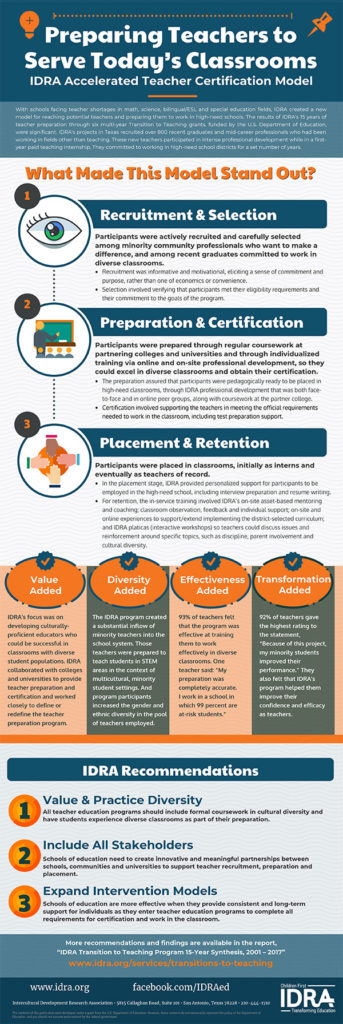• Felix Montes, Ph.D. • IDRA Newsletter • September 2018 •


The innovative approach was summarized in the recent IDRA publication: IDRA Transition to Teaching Program – 15-Year Synthesis. Dr. María “Cuca” Robledo Montecel was the program’s principal investigator, Dr. Abelardo Villarreal served as its program manager, and the programs were directed by Dr. Linda Cantu, and Dr. Felix Montes.
Teacher Shortage Areas Consistently High Nationally
Many schools in Texas don’t have well-prepared teachers to serve their increasingly diverse classrooms, particularly in bilingual/ESL, special education, and STEM. In early September, the Houston Chronicle sounded the alarm once again about this problem for special education, stating: “Where will schools find up to 9,000 new special education teachers? Schools already have a hard time recruiting special education teachers, so much so that the state offers incentives, such as student loan forgiveness programs. But those incentives aren’t enough to meet the demand, leaving schools across the state struggling every year to find enough teachers to provide specialized services to students” (Matos, 2018).
IDRA’s new report underscores the severity of this issue through the remarkable consistency of the teacher shortage areas reported annually by the Texas Education Agency (TEA) to the U.S. Department of Education.
The Department of Education receives similar figures from other states and combines them to make a global list of high-need fields in schools that serve low-income students. The most recent listing includes: bilingual education and English language acquisition, foreign language, math, reading specialist, science, and special education (August 2017). Both TEA and the U.S. Department of Education show that the shortage of teachers in high-need schools is critical.
IDRA’s Transition to Teaching Program


Funded by the U.S. Department of Education for 15 years through six multi-year Transition to Teaching grants, IDRA partnered with higher education teacher preparation programs, and 55 urban and rural high-need school districts across Texas. The figure on the next page illustrates this unique accelerated preparation program.
- IDRA’s program comprised three sequential gears:
- Recruit and carefully select participants among minority community professionals who want to make a difference and recent graduates committed to work in diverse classrooms.
- Prepare them through regular coursework at partnering colleges and universities, and individualized online and on-site professional development, so they can excel in diverse classrooms and obtain their certification.
- Place them in the classrooms, initially as interns, eventually as teachers of record.
After placement, teachers continued to receive from IDRA highly personalized asset-based mentoring and coaching, classroom observation and feedback, and focused interactive workshops called platicas. In these platicas, teachers discussed topics they were engaged with, such as cultural awareness in bilingual classrooms, teaching multilevel language groups, engaging students, and reading in the content areas. This assured that teachers had a rewarding experience with peer support in their newly-acquired profession, increasing their chances of staying in it. All of this made a difference, as demonstrated below.
IDRA’s synthesis report published this month shows that IDRA recruited 935 prospective teachers. Out of these, 815 completed the program and 768 started teaching in high-need classrooms fully certified. All figures exceeded the program’s targets. Not only were the teachers well-prepared, but demographically they also resemble their classroom profiles better than the rest of teachers in Texas.
IDRA helped improve existing alternative route programs by emphasizing minority student needs and the importance of preparing teachers to succeed in a multicultural environment. Comments from collaborating school administrators revealed a high level of satisfaction: “Districts needed knowledgeable, capable teachers to help students succeed in high-need subject areas – mathematics, science, language arts. IDRA assured that all teachers selected met the requirements to be selected to enroll and complete projects requirements, successfully passed state test requirements and were placed in high-need campuses.”
More than 93 percent of teachers felt that the program was effective at training them to work effectively in diverse classrooms. One teacher said: “My preparation was completely accurate. I work in a school in which 99 percent are at-risk students.”
On-site mentoring and coaching was the most successful way to support teachers. As one teacher indicated: “My mentor highlighted what we should expect in the classroom and [how to] handle ourselves outside.”
According to these teachers, the program’s main strength was that it presented an opportunity for them to:
- obtain the required training to function efficiently in a multicultural setting;
- facilitate their transition from training to teaching by supporting their interaction with the district and school staff;
- focus on student success by emphasizing high expectations for all students; and
- realize all of this in a friendly environment where they learned from each other and could ask for help whenever they needed it.
The report concludes with important recommendations for teacher preparation programs, organized in three areas.
Value and Practice Diversity – Place a high value on teacher education for diverse student populations and support their work across disciplines. Schools of education should hire faculty who are experienced, well-prepared and knowledgeable about effective strategies for diverse students, including competencies that emphasize all aspects of developing student self-esteem.
Include All Stakeholders – Expand research and knowledge about effective teacher preparation involving all stakeholders in the education process. Non-profits and community-based organizations can provide a link with the wider society, particularly with minority communities.
Expand Intervention Models – Develop holistic assessment and support programs for educators that rely primarily on the demonstration of knowledge and performance in the classroom.
Schools of education are more effective when they provide consistent and long-term support for individuals as they enter teacher education programs. Effective strategies support teaching throughout and beyond the certification process by enabling prospective teachers to study theory and to practice during their training while applying prior experience in the classroom. Co-teaching, group planning and similar collaborative strategies used in IDRA’s Transition to Teaching program are critical to long-term success and sustainability. Teaching does not have to be a lonely endeavor; teachers can support each other to ease their work and accelerate their growth.
Resources
Robledo Montecel, M. (principal investigator, Villarreal, A., (program manager), Cantu, L. (program director) & Montes, F. (program director). (September 2018). IDRA Transition to Teaching Program 15-Year Synthesis, 2001 – 2017. San Antonio, Texas: Intercultural Development Research Association.
Matos, A. (September 6, 2018). “Texas expects thousands more special education students. But where are the teachers?” Houston Chronicle.
Felix Montes, Ph.D., is a senior education associate. Comments and questions may be directed to him via email at felix.montes@idra.org.
[©2018, IDRA. This article originally appeared in the September 2018 IDRA Newsletter by the Intercultural Development Research Association. Permission to reproduce this article is granted provided the article is reprinted in its entirety and proper credit is given to IDRA and the author.]


